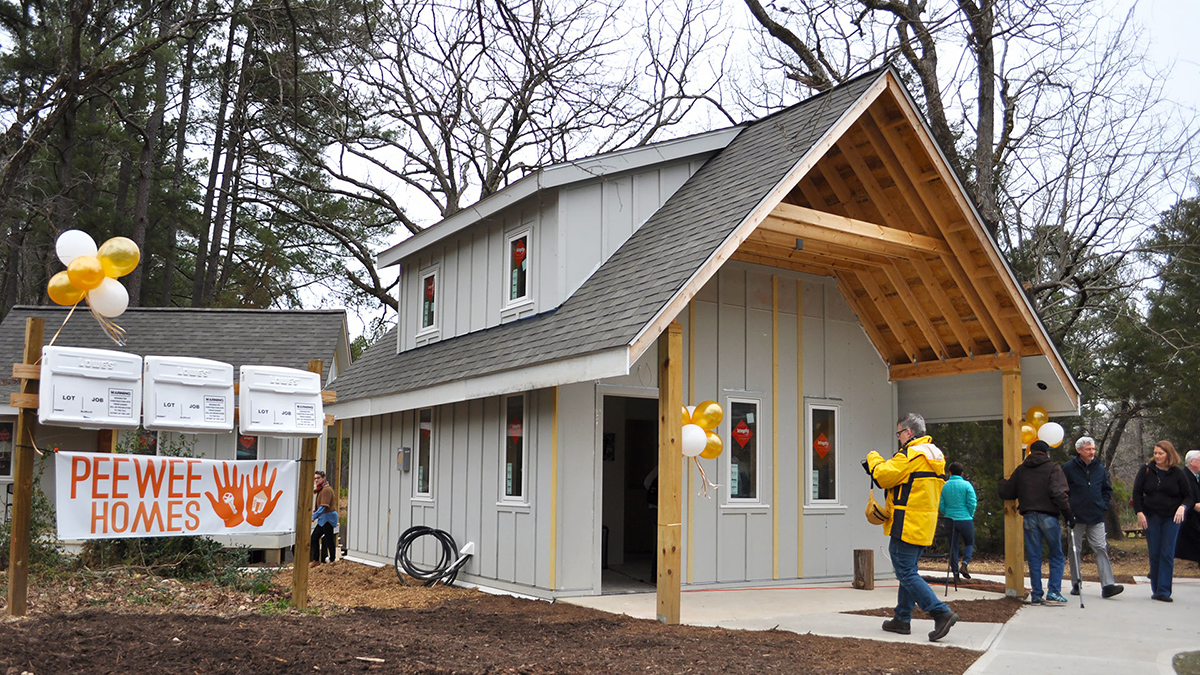Profits with Purpose
Kenan-Flagler professor Jim Kitchen challenges undergraduate students in his Entrepreneurship and Business Planning course to come up with business ventures that will ultimately help charities across the Triangle.
By Kristin Stepneski, UNC Kenan-Flagler Business School, Monday, March 11th, 2019

Being a great entrepreneur is more than making profits – it’s about purpose. That’s a key message UNC Kenan-Flagler professor Jim Kitchen teaches undergraduate students in his Entrepreneurship and Business Planning course.
Kitchen challenges them to come up with business ventures, and profits go to charities across the Triangle.
“Since I started this project in 2012, we’ve generated almost $250,000 in profits for local charities,” Kitchen said. “Entrepreneurship is a contact sport. It must be experienced. So for this project, students succeed or fail based on their ideas as well as their abilities to execute on branding, marketing, sales, managing, creating partnerships, scaling and pivoting when required.”
But the project is more than learning the basics. “It’s about teaching students to think about what is important to them and why, and identifying and developing the values that will guide them for the rest of their lives.”
“This class taught me so much about the importance of incorporating service into our learning,” said sophomore Raven Seldon.
Students are expected to generate approximately $1,000 in profits in four weeks.
“I thought Professor Kitchen was either joking or that his class was about to be impossible. Little did I know I was getting into a service project that would teach me more about myself as well as the importance and impact of service,” Seldon said.
Each class brings new business ideas and higher profits. In 2012, students earned $6,500 in profits. In 2018 students earned $85,000, more than 10 times the first year’s earnings. Part of the success is that students connect emotionally with the project.
One charity that has benefited from the students’ business skills is Pee Wee Homes.
A project of the Church of the Advocate, Pee Wee Homes helps tackle the affordable housing issue in the Chapel Hill area.
“The homes support people who are experiencing or who have a chronic history of experiencing homelessness and who are earning below 30 percent of the area’s median income or about $1,000 per month,” said Maggie West, treasurer of the board of directors for Pee Wee Homes.
Kitchen’s classes gave $37,000 to help build a home, which will be available for residents in spring 2019.
This isn’t the first time West worked with Kitchen. She also collaborated with him when she worked for the Community Empowerment Fund.
“Jim approached us about this idea of working with his business class to help provide cars for CEF members who needed transportation for work, medical reasons or for their education who were struggling to afford to buy a car,” West said. To date, course profits have purchased seven cars for CEF members.
She appreciates the creativity in the students’ business ventures. “Getting to hear the different ways the students have hustled, earning thousands of dollars in some cases, has been really impressive and inspiring to see,” West said.
Kitchen connects the importance of purpose and social investment and community investment in his teachings and through these class projects.
“UNC Kenan-Flagler is very good at training students to be consultants and investment bankers. Teaching our students to be well-balanced, and contributing global citizens is equally as important. Students learning how success and wealth fits into their lives — versus being the sole focus of their lives — is critical,” Kitchen said.
“It’s a beautiful thing and remarkable to me to have students in a business school, where they are learning about for-profit enterprises, to be challenged to contribute to the needs of the community in which they’re going to school,” said Rev. Lisa Fischbeck of Church of the Advocate. “To have that be part of their training from the very beginning is exemplary to me.”
Kitchen’s fall 2018 classes earned $40,000 toward the construction of more tiny homes at a new site.
“Jim’s classes’ participation has made all the difference in our being able to proceed with this project. Without that, our fundraising goals would have been a lot harder to reach,” Fischbeck said. “The students’ work is making this project possible, that’s clear.”
Also benefiting from the students’ work is the Chapel Hill-Carrboro Public School Foundation, which received $45,000.
“We are so deeply grateful to be selected as a recipient of the funding from the UNC Kenan-Flagler class,” said Lynn Lehmann, executive director Chapel Hill-Carrboro Public School Foundation. “These funds will be put to good use to ease the burdens of our overworked and underpaid school teachers.
“When we partner with community members, like UNC Kenan-Flagler students who are studying entrepreneurship, we open up more opportunities to support our local K-12 teachers in Chapel Hill and Carrboro. Through the school supply project that was designed by the UNC students, teachers will receive much-needed supplies to meet the needs of their classrooms throughout the school year.”
“The schools are fortunate to have community partners like Kitchen and UNC Kenan-Flagler,” said Jeff Nash, executive director of community relations for Chapel Hill-Carrboro Schools. “Students will receive a direct benefit from their generous contribution. We cannot thank them enough for choosing to partner with us.”
“Professor Kitchen is transforming his classroom into a platform for social change. His dedication to his students, and the Chapel Hill community is inspiring,” said sophomore Laci Motley.
“This class challenged me to think creatively and pushed me to step outside of my comfort zone,” Seldon said. “It taught me lessons on how the real world works for entrepreneurs and business owners who want to make profit.”
After class ended, Seldon volunteered with Pee Wee Homes to help build a home. “Being able to see what my efforts and hard work went toward allowed me to know that I made a positive impact on someone’s life.”
And that’s exactly the lesson Kitchen wants his students to learn.
